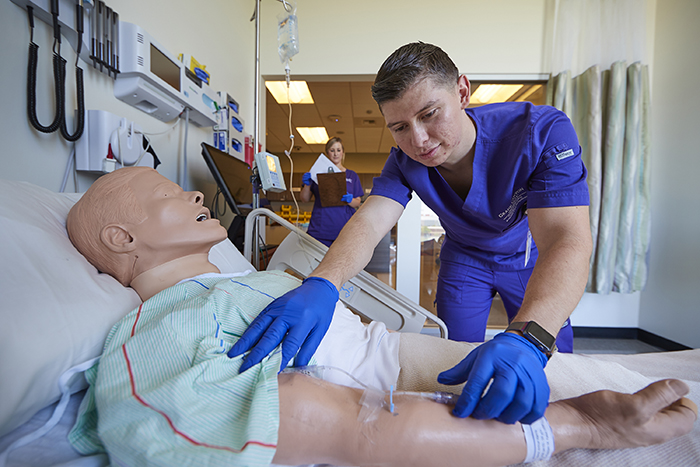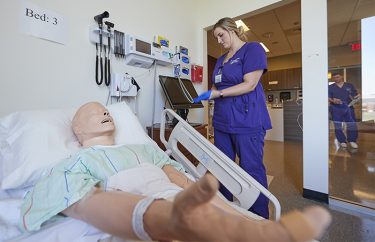
By Lana Sweeten-Shults
GCU News Bureau

Grand Canyon University’s Nursing program has posted the highest first-time pass-rate among the state’s major universities for the second straight quarter on a national licensure examination. More than 98% of the University’s prelicensure nursing graduates passed the test in each quarter.
Recent GCU nursing graduates achieved a 98.61% first-time pass rate for the second quarter of 2019 on the National Council Licensure Examination, or NCLEX. That followed the 98.21% first-time pass rate in the first quarter. Combined, 181 of the 184 nursing graduates who have taken the test thus far in 2019 have passed on their first attempt.
The standardized exam is used by each state board – the Arizona Board of Nursing in this case – to determine whether a candidate is ready to enter the nursing field. To become eligible to take the test, GCU students must graduate from the College of Nursing and Health Care Professions’ prelicensure program. Once they pass the test, they receive their professional license and can start working as a registered nurse in the field.
“The fact that we’ve been able to sustain those high first-time pass-rate numbers two quarters in a row shows that we’re doing the right things,” said Amy Leach, the college’s NCLEX Success Manager. “We’re performing well compared to what the national and state standards are.”
The second-quarter numbers surpass the state first-time pass-rate average of 92.90%.

GCU’s performance is particularly impressive, considering that the University graduates the most prelicensure nurses of any school in the state at a time when the nation continues to face a nursing shortage – a shortfall expected to hit Arizona particularly hard.
According to the Bureau of Labor Statistics, the country will need more than 1 million registered nurses by 2024, with Arizona expected to be one of 16 states to experience that shortage through 2025, reports the Health Resources and Services Administration in its “The Future of the Nursing Workforce” (2014).
The impressive first-half test scores follow a strong 2018 in which GCU nursing graduates registered a 91.5% first-time pass rate. The continual ascension of students’ scores on the NCLEX couldn’t happen, said College of Nursing and Health Care Professions Dean Dr. Lisa Smith, without the support and efforts of so many at the University.
“The program success is due to a huge team effort, which began with the commitment and tremendous support from President (Brian) Mueller and our provost, Dr. (Hank) Radda,” Smith said.

It was two years ago when the college set its sights on improving the first-time NCLEX pass rates while continuing to graduate the most prelicensure nurses in the state.
“Two years ago our students were still passing the NCLEX at an eventual 95% rate and entering the workforce as prepared nurses,” Smith said, “but some took the test multiple times before passing. We needed to improve the first-time pass rate, for which nursing schools are judged. To do that, we looked at literature to examine best practices for first-time pass-rate success and compared that to what we had in place.”
The college also hired Leach as a dedicated NCLEX Success Manager to focus on making sure GCU’s nursing students are prepared to perform well on the exam.
“She helps students understand the standardized tests they need to take, tracks students’ scores and meets them for one-on-one coaching sessions, if needed,” Smith said. “She also leads test-taking strategy sessions and invites faculty to sit in on one-on-one coaching sessions to give them exposure on how to coach students in the classroom.”
Leach has been a big part of some of the curriculum changes in the program.
By analyzing students’ HESI data, for example, Leach said she and the nursing faculty can find ways to improve classroom strategies. Materials from HESI, or Heath Education Systems Inc., help students prepare for their licensure tests.
One such classroom strategy that has been incorporated into the curriculum is immersive simulation. The college had been using simulation to teach small groups of students for several years but decided to change the focus of simulation from instruction to an immersive simulation experience. In this type of setting, a student is required to use clinical reasoning to critically think through their patient scenario to replicate real-world situations in which nurses might find themselves. And this fall, the college is adding to that immersive simulation experience by incorporating standardized patients – live actors who will act out a script to provide students with even more realistic scenarios.
Students also take practice standardized tests more often than in the past. Students used to take a practice test at the end of the program only, but now those practices have been threaded throughout the program, so they’re getting more exposure.

And the University enhanced the GPA requirements in its admissions criteria, putting more weight on applicants’ grades in core academic disciplines.
Besides adding an NCLEX Success Manager, embedding more NCLEX preparation material into the curriculum and adjusting the admissions criteria, the CONHCP also has continued to hire faculty and administration with strong nursing experience.
“We found a nice fit and combination of things to achieve that student success,” Leach said. More than that, “Students just seem more engaged in the process.”
GCU senior writer Lana Sweeten-Shults can be reached at [email protected] or at 602-639-7901.
****
Related content:
GCU Today: GCU Nursing posts 98% 1st-time pass rate on exam
GCU Today: Nursing lessons come to life in immersive simulation
GCU Today: Shot of hope -- Nurse has heart for helping people
AZ Family: GCU nursing students get state-of-the-art training



































































